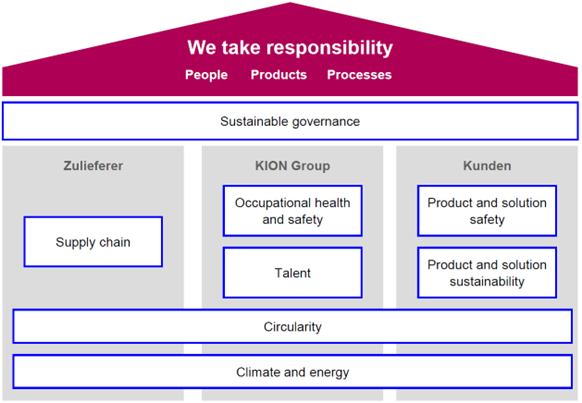Sustainability Strategy and Management

The KION Group follows a systematic, Group-wide approach to implementing its sustainability strategy. Incorporating sustainability in the new Group strategy “Playing to Win” is of central importance here, as it not only ensures profitable growth, but also reinforces the company’s commitment to its workforce, the environment and society.
Double Materiality Analysis
The focus of STILL’s sustainability activities is based on the results of the KION Group’s “double materiality analysis” (DMA), which was carried out in 2023 and completed in 2024. The DMA is used to identify and assess material impacts, risks and opportunities (IROs) compared to immaterial IROs.
To identify the IROs, various sustainability aspects from both internal and external analyses were covered in the DMA and various relevant stakeholder groups were directly and indirectly involved. The assessment is conducted according to the principle of double materiality in line with the CSRD using the ESRS. Both the environmental and social impact of the KION Group’s business activities (inside-out) and the financial risks and opportunities for business activities (outside-in) were examined and evaluated as part of this process.
The main IROs in the ESRS topics “Climate change,” “Pollution,” “Water and marine resources,” “Circular economy,” “Own workforce,” “Workers in the value chain,” and “Business conduct” are mainly governed by the strategic objectives within the KION Group’s sustainability strategy or are addressed at another level within the programs of the eight action fields for sustainability. Key findings and newly identified, additional specific topics are taken into account in the ongoing development of the sustainability strategy and when setting targets.
A detailed overview of the topic-specific ESRS for the KION Group based on the double materiality analysis carried out can be found in the Group Sustainability Report in the KION Group Annual Report 2024.
Action Fields in the Sustainability Strategy

In implementing its sustainability strategy, STILL follows the systematic approach defined by the KION Group. STILL’s sustainability approach is defined through overarching targets and initiatives under the three strategic dimensions of people, products, and processes, as well as the overall principle of “taking responsibility.” These three dimensions provide the framework for the business’ eight targeted areas of action on sustainability. In line with the KION Group’s sustainability strategy and materiality analysis, STILL pursues a specific program of targets, initiatives, and monitoring within these action fields, in order to meet stakeholder expectations and ensure compliance with political and legislative requirements.
The Group-wide sustainability strategy is constantly being refined, taking into account the results of the double materiality analysis. This includes defining and specifying targets, comparing them with external requirements, and coordinating with internal stakeholders at Group level and within the Operating Units. The strategic objectives that STILL pursues as part of the KION Group can be found under “Leading targets” .
Specific strategic and measurable sustainability targets have been defined for each of the eight action fields and the most important levers and relevant KPIs identified. Detailed action plans have also been devised to put the targets into practice (for more information, see the Group Sustainability Report in the KION Annual Report 2024). The individual targets, sub-targets, and corresponding measures are reviewed at regular intervals,
As part of the KION Group, STILL complies with the principles and policies for sustainable business practices in place across the group. Sustainability criteria are also firmly integrated in operational business activities by implementing company-specific guidelines and procedures. These include guidelines for integrated HSE (health, safety, and environment) management and certification in line with labor and environmental standards (ISO 14001, ISO 45001, and ISO 50001).
Company
STILL is a leading supplier of internal logistics solutions, with a portfolio that includes forklift trucks, warehouse trucks, networked systems, and support services. Founded in 1920 by Hans Still, the company’s hallmarks include targeted, tailor-made solutions backed up by outstanding service. STILL has set itself the goal of making intralogistics processes ‘smart’. To this end, the company develops intelligent solutions with the aim of creating warehouse management workflows that are smoother and more efficient. These workflows provide more effective protection for workers’ health while ensuring the company can meet the highest standards of sustainability. STILL is thus forging ahead with new solutions for electric vehicles and automation—from fleet and energy management through circularity, which refers to the approach of consistently conserving resources and recycling the materials used. STILL’s ethos is to be a smart and dependable intralogistics partner. The company offers a wide-ranging portfolio of trucks, systems, and consulting services that ensure every customer receives custom solutions designed to meet their precise needs.
In addition to selling new products, STILL also offers used trucks and rental options. With an extensive fleet of over 35,000 rental trucks, the company has a solution for every customer requirement.
Sustainability Organization
Since 2023, the Chief People & Sustainability Officer (CPSO) within the Executive Board of KION GROUP AG has been responsible for human resources and sustainability, including occupational health and safety. In this role, her responsibilities include ensuring that the sustainability strategy is developed and implemented in line with the company’s objectives. She also chairs the Sustainability Council, which includes the leaders responsible for the eight action fields, the sustainability coordinators of the Operating Units and functions, and members of the central sustainability management team (Corporate Sustainability). STILL is represented on the Sustainability Council as part of the KION ITS EMEA Operating Unit.
Progress is regularly reviewed by the sustainability coordinators of the Operating Units, the leaders responsible for the action fields, the central sustainability management team, and special committees. The progress reports for the individual regions and functions are submitted to the overarching central sustainability management team (Corporate Sustainability) and the Sustainability Council, and discussed at Executive Board meetings as part of the KION Group’s Group-wide strategic development and implementation. The Executive Board of KION GROUP AG involves the Supervisory Board, and in particular its Audit Committee, in the development of the sustainability strategy. The Supervisory Board monitors the Executive Board with regard to the implementation of the sustainability strategy and supports it in an advisory capacity.
Initiatives
In 2023, the KION Group announced its official commitment to the Science Based Targets initiative (SBTi), with a view to achieving the long-term climate target of net-zero greenhouse gas emissions across its value chain by 2050. Significant interim targets have been set for 2030 (see targets in the Group Sustainability Report in the KION Group Annual Report 2024). STILL thus has a basic methodological framework for its climate action and is committed to the target of limiting global warming to 1.5 °C above pre-industrial levels, which was adopted at the United Nations Climate Change Conference in Paris in 2015. The climate management targets were formally recognized by the SBTi in 2024. The KION Group’s voluntary commitment under the SBTi is publicly accessible at www.sciencebasedtargets.org/target-dashboard and is also communicated internally to its own employees, as well as customers and suppliers.
Since 2012, STILL has been regularly audited and certified as a supplier with regard to corporate responsibility by independent service provider EcoVadis. Having received an impressive Gold rating from EcoVadis in recent years, the company continued its winning streak in 2024, achieving a Platinum medal—the highest possible sustainability rating—for the third time in a row. This outstanding result puts it among the top 1% of all EcoVadis rated companies. STILL’s scores were above average across all four categories on the EcoVadis scorecard. In the “Environment” and “Labor and Human Rights” categories in particular, STILL scores nearly double the average for all rated companies, and its results in the “Ethics” and “Sustainable Procurement” categories are also excellent. The EcoVadis assessment is based on 21 criteria across the four categories and is calculated in line with international sustainability standards such as the Global Reporting Initiative, the ILO Conventions, the UN Global Compact, the UN Guiding Principles on Business and Human Rights, and the ISO 26000 sustainability standards.
STILL is also part of the Blue Competence initiative organized by the German Mechanical Engineering Industry Association (VDMA), which aims to promote sustainability in mechanical and plant engineering and inform the industry about sustainable solutions. As a partner to the initiative, STILL agrees to comply with the initiative’s 12 guiding principles for sustainability in the mechanical and plant engineering industry.
In addition, STILL is part of UmweltPartnerschaft Hamburg, a large network of companies committed to protecting our climate and environment in the long term. Faced with the realities of climate change, the network particularly wants to help advance the energy transition by reducing energy consumption and promoting new approaches to material flow management in order to make more efficient use of available resources. By 2030, the city of Hamburg aims to cut its CO2 emissions by 50% in comparison to 1990 levels; and by 2050 it plans to increase this figure to at least 80%. As an active member of UmweltPartnerschaft Hamburg, STILL is playing its part in combating climate change by implementing its energy policy in line with its DIN EN ISO 50001 certification.